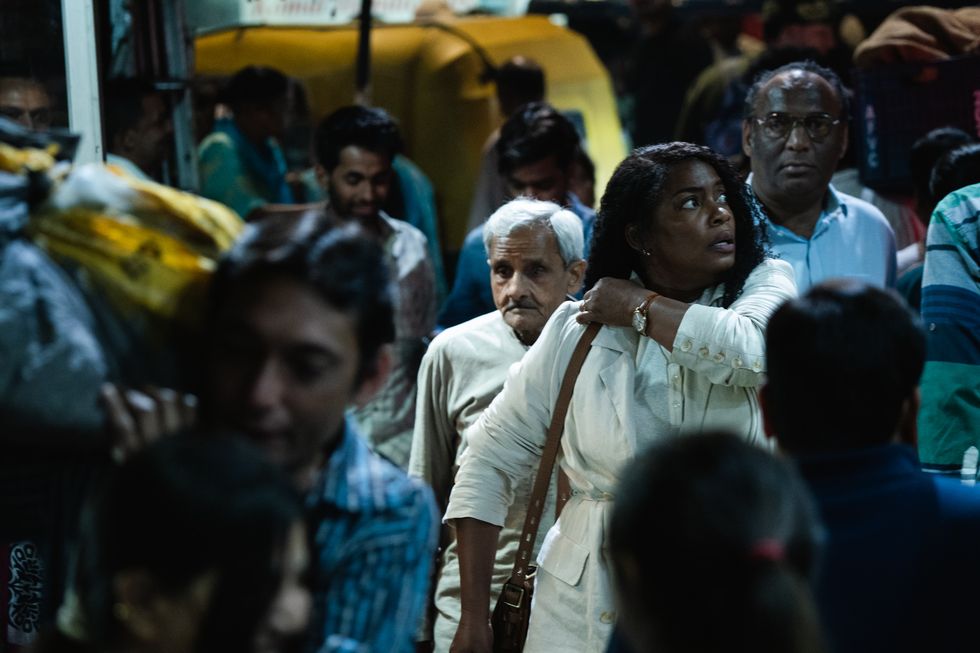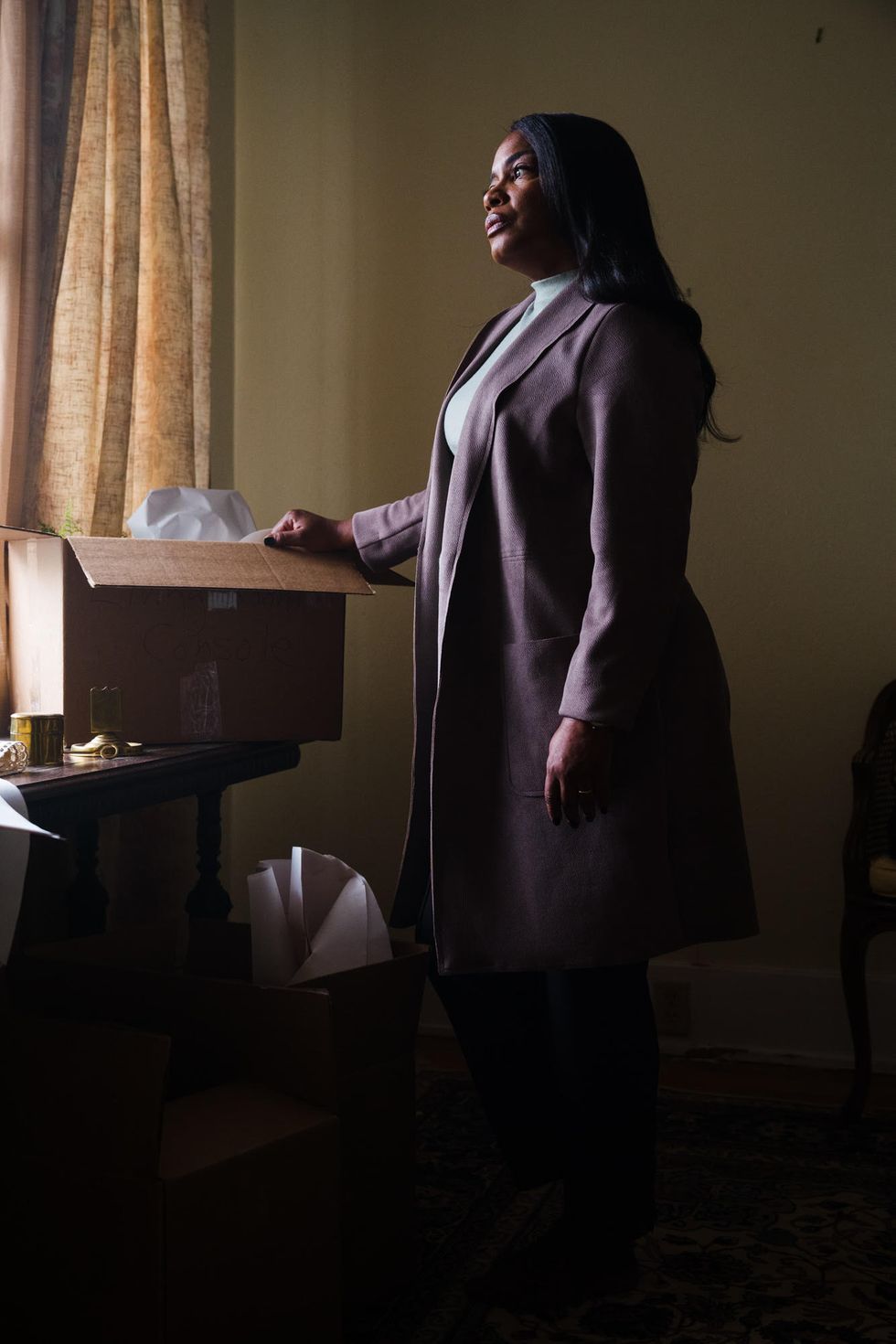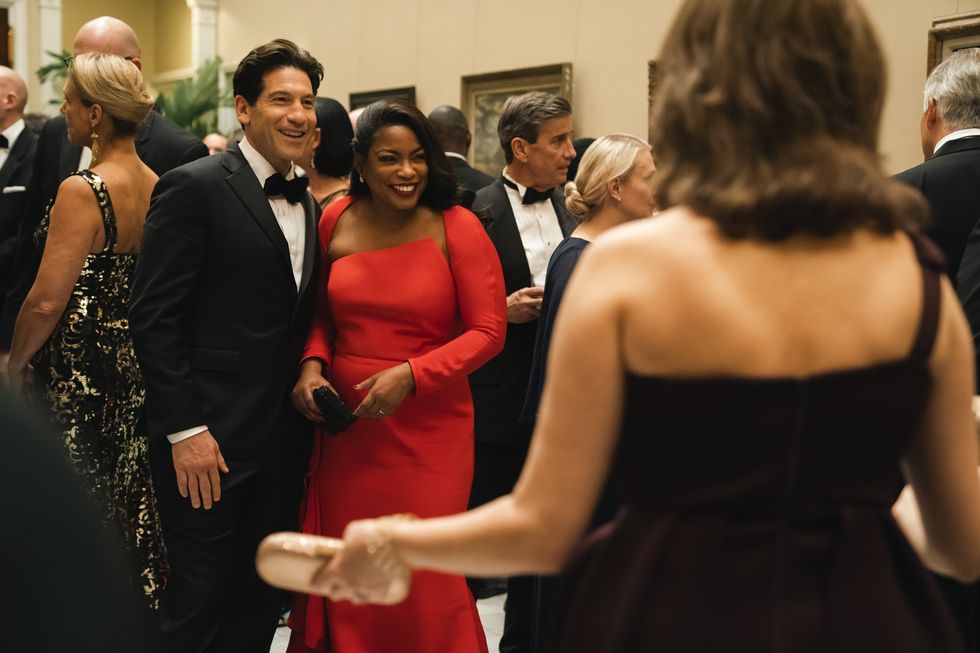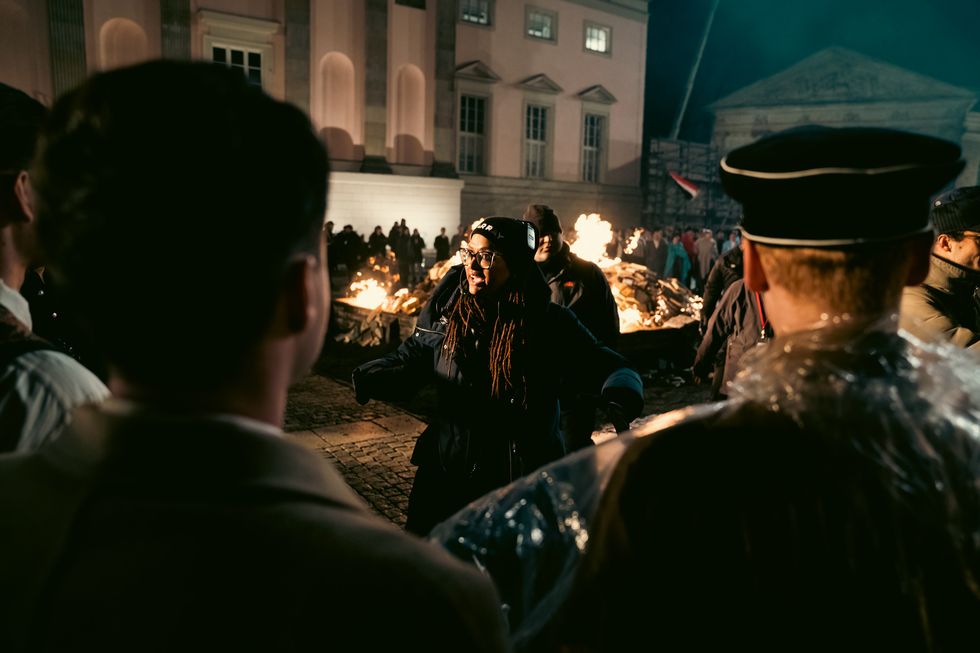With Origin, Ava DuVernay Wants Audiences To See The Glass More Full Than Empty
Spoilers for Origin below.
Across nearly two decades of filmmaking, director, writer, and producer Ava DuVernay has exhibited a continued commitment to exploring how and why our society operates the way it does. Whether investigating mass incarceration and the prison industrial complex in her BAFTA-winning documentary 13th or re-examining significant pieces of Black history in projects like When They See Us and Selma, the Oscar nominee has frequently used her work to probe into uncomfortable conversations about both the beauty and devastation of humanity. Still, nothing could have prepared her (or us) for Origin, the director’s most ambitious offering to date, which adapts—or, more accurately, completely transforms—Pulitzer Prize winner Isabel Wilkerson’s incisive nonfiction tome Caste: The Origins of Our Discontents.
In her book, Wilkerson draws parallels between India’s centuries-old social hierarchical system and Nazi Germany’s eugenics-based regulations to present the thesis that it is caste (not racism) that undergirds much of the prejudice and injustice in American society. (Racism, for what it’s worth, is simply one aspect of the stratification that caste systems produce.)
For Origin, DuVernay expands on Wilkerson’s already substantial research, crafting a film that doesn’t just illustrate the writer’s findings, but firmly places her inside the narrative itself. Through extensive conversations with Wilkerson, DuVernay found that, as she was writing Caste, the journalist was also facing great personal trauma. These real developments — which include the back-to-back-to-back deaths of her husband (played by Jon Bernthal), mother (Emily Yancy), and cousin (recent Emmy winner Niecy Nash-Betts) — become key anchors in DuVernay’s version of the story. With Wilkerson as Origin’s central character (played brilliantly by Academy Award nominee Aunjanue Ellis-Taylor), DuVernay gives honor to both the research and the seemingly insurmountable circumstances the writer had to overcome to complete it.
The resulting film is astonishing, in both content and scope. Filming across three continents, DuVernay, along with her cast and crew, traveled to Berlin to recreate a Nazi book-burning, to India to show how Dalits (the lowest-rung caste, once known as “Untouchables”) are forced to clean human excrement using their hands, and back to the U.S. to detail the 1951 story of a young Black boy who was forbidden from playing in the same pool as his white Little League teammates. Yet, in spite of this, Origin still operates with a sense of hope. The film might open with the tragic murder of Trayvon Martin, but in scenes of Isabel interacting with friends, family, and colleagues, DuVernay ensured that audiences felt the love too. After all, as the director says in a recent interview with ELLE.com, “Maybe we need to start to see the glass as more full than empty.”
How did you decide that Isabel Wilkerson should be a part of the story you were telling? She isn’t much of a character in her own book, but she is undoubtedly the heart of Origin.
Usually, as a screenwriter, when you’re adapting something, there’s a story, with a beginning, middle, and end, and you look at it and say, “Which pieces of this are the most emotionally propulsive that I can make into a movie?” But this was a bit more intricate. I had to figure out how to create a story out of these facts and figures and anecdotes.
Within the pages of [Caste], Isabel actually is there, but she’s hidden. Now and then, she’ll talk about the research she does, in first-person: “I went here.” “I did that.” That started to help me think, Wow, she’s in there. What if I show her in her thinking and research process? I thought that would be the extent of it until I actually had the opportunity to meet her through our various interviews and realized that she had this robust, emotional personal life that was fascinating, dramatic, deeply meaningful, and could run alongside the book. That was the process.
What drew you to Aunjanue Ellis-Taylor as the lead?
Aunjanue Ellis-Taylor is a singular force. She is a wildly talented individual who brings a deep intellect to everything that she does. An imagination. Ideas. Information. I mean, she’s a whirlwind of energy when it comes to creativity—and it’s not outward energy; it’s a conserved creative energy that’s very deep. So for any director, writer, or producer, to have the entity that is Aunjanue Ellis-Taylor on set with you, working with you side-by-side to bring a story to life…well, it’s an honor and a privilege, and you jump at the chance. So I did.
Speaking of, you recently posted a video on Instagram of Aunjanue passing out postcards promoting the film alongside a heartfelt caption about the bittersweetness of the sight, noting how it’s great to see her promoting the film but how much better it’d be to see her doing it on red carpets in the midst of awards season. Aunjanue isn’t new to that world—she was just on the circuit for King Richard—so do you have thoughts about why it’s not happening for her, and the movie, right now?
It’s not happening because of a lack of promotion and strategy. We’re with a very small distributor, and so I really think people just have not seen the performance, which is unfortunate. But we’re hoping that that’ll be remedied when it’s in theaters with real people. That will be too late for all of the awards hoopla, and it’s unfortunate that the ball was dropped in that way, but real people, real things—that’s what Niecy Nash says in the movie, and that’s what we focus on. So we are excited to present the film and really let it do what it was made to do, which is to move through the world, to hopefully shift people’s perspectives about things, to peak their curiosity about this whole theory of caste, and to invite them to engage with it.
I feel like you’ve created a new cinematic language with Origin. The film feels like a hybrid of both narrative and documentary, where it’s obviously a scripted film but still weaves in these documentary-like elements. It’s a story about a woman and her family, but also a story about a woman doing research, while also being a story about that research itself. How did you settle on the structure of the film?
Well, it’s flattering that you say it’s documentary because it’s not documentary. But it is fashioned as a narrative to feel like documentary. I mean, “true” documentary is documenting things unfolding in front of you with no plan. In Origin, everything is scripted, everyone’s in a costume, everyone is a person who’s been selected to be there.
But I like the idea of blurring the edges, of not quite knowing, Am I watching a non-actor, a real person? Or is this a trained actor? And at some point, it all kind of coalesces into one thing. … The idea is for it to all be one thing, because caste, even though it looks different on the top, is all one thing underneath. It is a foundation of all of our -isms: racism, sexism, classism, ageism, homophobia, Islamophobia, antisemitism. All of these -isms sit on top of caste; underneath, they’re all one thing. That was the idea, and it really drove a lot of the creative decisions.
The film opens with the murder of Trayvon Martin, and eventually, moves into scenes depicting lynchings and book-burnings. You’ve dealt with painful pieces of history before, but how do you avoid being triggered while revisiting these harrowing situations?
Well, I make movies about triumph—the triumph of Black people; the survival of the human spirit of people of every color, culture, and creed—and in order to triumph, you have to show what’s being overcome. In order to talk about survival, I have to know what you’re surviving. In When They See Us, to get to the triumph of the men in The Exonerated Five, when they’re holding up their hands and declaring their humanity and dignity at the end of that five hours, I’ve got to show you what they went through. It was the same in this. The culmination of the film is that Isabel Wilkerson has written this book, that she’s been able to drive through her personal loss to excavate and explore our collective loss. She’s been able to get to a place where she has triumphantly finished a book that she offers to the world. But in order to write the book, you’ve got to go through the hard stuff.
I always say that, while I’m showing you challenging material, there’s also joy side-by-side. The question is: Why are we so trained to focus on the challenges and not the joy? That’s a human instinct, and it’s something that we, within ourselves, need to explore. There’s way more romance, friendship, love, and connection in the film when you look at it minute-by-minute than there are challenging images. Yet, the challenging images are what we remember. Maybe we need to start to see the glass as more full than empty. That’s what we invite people to do in the movie.
I noticed that effort with the parts of Isabel and Brett’s relationship that you chose to highlight. In their meet-cute, for instance, Brett is effectively using his white male privilege for good, to help Isabel out in a situation where she’s being disrespected (at least in part, because she’s a Black woman). Or, in a slightly different way, there’s the basement scene between Isabel and the MAGA hat-wearing plumber, which doesn’t go the way we might expect. In this film about caste, what did you want to communicate about the ways people from different backgrounds can still see eye-to-eye?
I think you got it just right. The stories that I tell as it relates to Brett and Isabel are stories that happened. That particular story of the way that they met [plays out] the way that Isabel told me it happened, which I thought was just so gorgeous. So, yes, if white male privilege is a real thing and people see it as a real thing, then what are the ways in which that can be used in allyship? In community? In that story she told me, I saw [an answer].
And if the idea of recognizing someone’s humanity is of importance to us, then we have to do it even in times when we are uncomfortable and don’t want to, as Isabel did in the basement, which is another real story. The thing about Isabel is that what she’s able to extract from her real life to share with us become these pearls of wisdom that are guidance for the ways we can think about our own interactions with people that we agree with and that we disagree with.
Origin was originally set up at Netflix before you made the project independently. Given how huge an undertaking this is, how did it feel to take the helm and do everything yourself?
Netflix and I had a difference of opinion on timing, and Netflix was very generous to let us go make it on our own. So we went out and made it, and it was exhilarating and addictive. We didn’t pitch it to other studios. We raised the money through like-minded people and philanthropic organizations who believe in justice and dignity for all, and believe in creating projects that amplify that. We said, “We have this idea.” They said, “Yes,” and we couldn’t believe it.
Six months later, we were shooting in Berlin, in Delhi, in Savannah, on a beautiful 37-day shoot on three continents; with a cast that I chose and didn’t have to fight a studio for; on 16-millimeter film, which is a format that I’d always asked studios to shoot on and have never been granted access to; and with a story that’s untraditional, that blurs the lines on traditional formats and screenplay structure. And we were able to do it! It was a freeing, fueling experience for me, and it’s really one that I’ll take with me when I move forward with the next project.
Outside of directing, you have a very prolific production and distribution company in ARRAY Filmworks. What are you looking for in projects from other filmmakers?
I’m a proud distributor of films for other people. We’ve been distributing films through ARRAY for over ten years now. One of our filmmakers that we’re so proud of is a young filmmaker who made a film called The Burial of Kojo. It was on the film festival circuit and was beautiful, but no one was picking it up. So we came, picked it up, released it, and now that filmmaker’s second film is The Color Purple. That’s Blitz Bazawule.
So I think it’s important to recognize someone who’s expressing a point of view. Whether I’m in agreement with it or not, they should have a voice and should be working hard to create a film that amplifies that voice. They should have something to say that’s worthy of being heard. If we see a film like that and there’s anything we can do to help, we take it and try to share it with the world. We’re a tiny imprint, but by amplifying someone like Blitz, or Isabel Sandoval, or Sterlin Harjo, we hopefully put them in a place to make a second film, and a third. We’re helping to grow the voices that are saying something outside of the typical box of our industry, which is my goal.
What keeps drawing you to these stories about minority communities and our resilience?
I just make films about what I’m interested in. So if I’m reading The New Jim Crow by Michelle Alexander, a book that I found fascinating and wanted to know more about, I’ll research more, and then feel like, Wow, other people should know about this. So I made 13th. [For When They See Us], I was approached by the real men of The Exonerated Five to tell their stories, and as I delved into the research, I thought, This is fascinating, and no one’s heard their side. I’m interested in it and I believe other people will be too. And I was very interested in taking a book that had been well-known and well-loved forever and ever in A Wrinkle in Time. So when Disney approached me and said they wanted to do that film with a Black girl at the center—a Black girl who saves the universe through her love—and asked if I would be interested in that? Heck yeah, I’m interested in that!
I just follow what I’m interested in, whether that’s Colin Kaepernick’s life as an early person in Colin in Black & White or Queen Sugar, a series we had on for seven seasons that chronicled the Black family. I’m fortunate enough to have the privilege of following my interests, and that’s what I’ll continue to do. But I don’t define it as “it’s about injustice.” I could be interested in, I don’t know, something that fits into a rom-com next. I stay open, so you never know.
This interview has been edited and condensed.
Michael Cuby is the Editor-at-Large for them. His work has appeared in GQ, Vogue, L’Officiel, and VICE. He is a film and television fanatic who has thankfully been given the opportunity to turn that addiction into a job. When he isn’t being productive, you can usually find him sitting in front of one of many screens.





